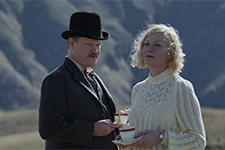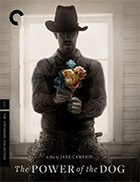The Power of the Dog (4K UHD)
|  Although set in the mid-1920s, Jane Campion’s The Power of the Dog, the first feature the New Zealand-born director helmed in 12 years, is nevertheless suffused with iconic Western imagery, which necessarily embeds its powerful story of repressed desire, barely concealed psychosis, and toxic masculinity within that most fabled and revered of American genres—one that the film systematically dismantles, revealing in stark terms the darkest recesses of life at the crossroads of wilderness and civilization. Unfolding over a period of years, it tells the story of two brothers who, despite having run an enormous Montana ranch together for 25 years, could not be any more different: Phil Burbank (Benedict Cumberbatch) is a hardened man of the outdoors who runs the cattle and never bathes, while George Burbank (Jesse Plemons) is a soft man who is more comfortable indoors and who Phil not-so-affectionately calls “fatso.” The distinction between them is neatly summarized by their introductions, as we first see Phil through the windows of the enormous manor walking in from the cattle yard, framed by desolate mountains and dusty wind; George is first seen reclining in a bathtub, smoking. Phil is the wilderness embodied, reveling in harshness and cruelty, while George strives for the comforts of civilization. The dichotomy is not so easy, though, as Phil is the more intelligent and educated of the two, and his embrace of the wild hints at a need to escape from an unnamed pain. His cruelty is a mask of sorts, emanating from a hollowness he can’t face. Phil and George’s already strained relationship, which is literally held together only by shared blood and financial interests, is pushed even further with the introduction of Rose Gordon (Kirsten Dunst), a quiet widow who runs a remote hotel and restaurant along with her son, Peter (Kodi Smit-McPhee), a lanky and effeminate teenager who we first see carefully fashioning paper flowers. George, desperate for companionship, asks Rose to marry him, and she and Peter come to live at the ranch with George and Phil, the latter of whom cannot (and does not want to) disguise his contempt for them both. He mocks them openly, honing his disgust into verbal bullets that he throws at them any chance he gets. He loathes Rose for her intrusion into their life, bringing femininity and domesticity into a world that he wants to keep rough and uncivilized. And he loathes Peter for his lack of traditional masculinity—his weak frame, his narrow face, his penchant for white clothes and carefully combed hair and willingness to serve others in a way that Phil sees as “womanly.” Yet, all is not as clearly demarcated as it initially seems, as the coming together of this quartet of characters sends them all into a downward spiral fueled by long-hidden secrets, desires, and an inability to communicate honestly. George, who is timid and inarticulate, wants to force the situation to be “normal,” which is dramatized most painfully in a scene in which he and Rose host a dinner with his elderly parents, and he convinces Rose to play the piano for them despite her limited ability, which humiliates her and makes him seem cruel when he is, in fact, simply awkward and dim. Phil’s constant torment eventually drives her to alcohol, which only makes her depressive unhappiness darker. Phil, meanwhile, is a coiled snake, full of venom and rage and hatred, and when he appears to take Peter under his wing and teach him the ways of the land, it is just a ruse to use him to undermine George and Rose’s relationship. Yet, something unexpected happens: Phil appears to genuinely start to like Peter and want to build a sort of surrogate father-son relationship with him. This softening of his hard, brutish character makes him vulnerable, laying open a trap into which he unwittingly stumbles. As it turns out, Phil and Peter share something in common: they are not at all what they seem. While Peter appears to be weak and vulnerable, he slowly reveals a potential for manipulation and cunning and violence and control that is initially disguised by his medical studies, which give apparent excuse for his dissecting animals. Phil, on the other hand, while apparently “all man” on the exterior, is haunted by his relationship with his mentor, a legendary cowman named Bronco Henry whose name is often invoked, but whose image is never seen, making him a literal ghost pulling Phil’s strings. That they had some kind of sexual relationship is obvious without being directed stated, which is part of what gives The Power of the Dog its potent draw: Campion makes everything clear without ever being direct. It is a rare film of distinct ambiguity that is nevertheless startlingly clear in both its narrative connections and thematic resonance. The film was based on a 1967 novel by Thomas Savage, a writer who specialized in novels set in the American West. Although he was raised on a Montana ranch and worked as a wrangler and ranch hand as a young man in Montana and Idaho, he loathed his homeland and wrote about it scathingly, portraying the West as a place of emotional desolation, violence, and hostility. Part of this surely arose from the fact that he was himself a closeted gay man who understood all too well the pains of living the lie that animates so much of The Power of the Dog. The book was well reviewed when it first came out and was optioned several times for a film adaptation, although it took its being reissued in the early 2000s to renewed acclaim to make that adaptation a reality. Jane Campion, who directed and wrote the screenplay, became an international icon of art cinema in the early 1990s with her Oscar-nominated indie hit The Piano (1993), which she followed with a series of challenging, but extremely uneven films centered around gender and power, including The Portrait of a Lady (1996), Holy Smoke (1999), In the Cut (2003), and Bright Star (2009). The Power of the Dog is easily her best film since The Piano, partially because she exerts such intense control over the material (some of her worst films, namely Holy Smoke and In the Cut, feel like they are constantly escaping her grasp and spilling into unnecessary excess and incoherence). Almost all of Campion’s films feature female protagonists, which makes it inherently intriguing that The Power of the Dog is fundamentally about masculinity and its various discontents, a topic that she treats with notes of grace and tenderness, making the film a far cry from the misandry that clouded some of her other works. While Phil would appear to be another iteration of the sleazy, controlling uber-masculine villains that gunked up Holy Smoke and In the Cut, he is instead a deeply complex, compelling, and very real character. Benedict Cumberbatch’s performance, which hinges on the sharp, painful discord between Phil’s exterior behaviors and his internal struggles, is the film’s masterful cornerstone. Phil is both loathsome and pathetic, magnetic and repulsive, powerful and frail. That mess of paradoxes keeps us drawn to him, perhaps against our will, and turns the film’s sudden and unexpected final moments into an ambiguous tragedy with which I am still wrestling after multiple viewings.
Copyright © 2022 James Kendrick Thoughts? E-mail James Kendrick All images copyright © The Criterion Collection | |||||||||||||||||||||||||||||
Overall Rating: 


 (4)
(4)


